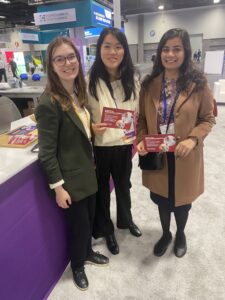As members of the 119th Congress gear up for a new legislative session, the ACR stands ready to welcome members of Congress and educate them about rheumatology policy priorities.

Postcard advocates with ACR staff.
Facilitating personal communication between ACR/ARP members and lawmakers about rheumatology-related policy is a key part of the ACR’s advocacy efforts. At ACR Convergence 2024 in Washington, D.C., meeting attendees were able to take part in advocacy firsthand by participating in a postcard-writing campaign to Congress.
The postcard campaign was a product of the newly formed Grassroots and Member Engagement working group of the Government Affairs Committee (GAC), which is tasked with coordinating advocacy outreach to ACR and ARP members. The group set out to actively engage members in advocacy, with a particular focus on those who may be unfamiliar with the College’s work.
“Writing a postcard gets at the heart of what advocacy is all about—reaching out to your lawmaker to share your story of why policy matters to you and your patients,” says Amanda Myers, MD, leader of the Grassroots and Member Engagement working group. “As clinicians and researchers, we have the expertise to guide improvements in the quality and administration of healthcare. In the face of numerous concerns, our job is to focus our legislators on the main priority—healthy citizens.”

Meeting attendees learn more about writing postcards to lawmakers.
“I did my best to make sure that the fellows and attendings I know came to write their postcards,” says Audrey Liu, MD, the fellow in training (FIT) member of the Grassroots and Member Engagement Working Group, who now serves on the RheumPAC Committee. “The postcards were a conversation starter for colleagues to voice their frustrations and see how they can turn this into something productive. For some of my colleagues, this was also an opportunity to learn who represents them and see the issues that ACR advocates for, [which is] a great entry point into advocacy.”
The Postcards
The campaign focused on two issues: policies to grow and support the rheumatology workforce and the importance of federal research funding for rheumatic disease. Members were able to choose one or both priorities and write about the importance of these policies for their practice and for their patients.
Some highlights from member postcards include:
Research
“As a physician who cares for people with autoimmune disease, we are learning that our patients are at a significantly higher risk of morbidity from cardiovascular disease. NIH-funded research is essential to the care of our patients. Please support the research we need to care for them!”
